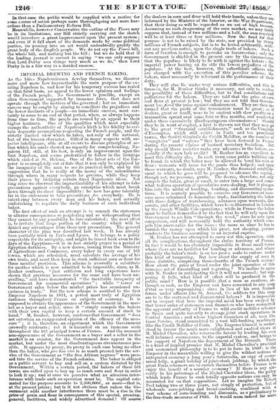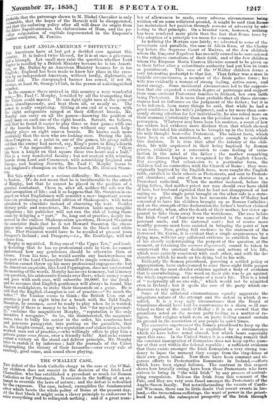IMPERIAL BREWING AND FRENCH BAKING.
As the Idees Napoleoniennes develop themselves, we discover more and more how impracticable the main purpose of the ex- isting Napoleon is, and how far his temporary: success has rested on that fatal basis, an appeal to the lower opinions and feelings of the French people. No Government is possible, except an alien Government supported by immense force, that does not operate through the motives of the governed ; but an immediate success may besought by aiming to conciliate the prejudices and the lower instincts of:a people-an immediate success, most cer- tainly to come to an end at that period, when, as always happens from time to time, the people are roused by an appeal to their higher instincts. One of the qualities which most especially/ stamps the authenticity of Napoleon's birth is his fidelity to cer- tain dogmatic assumptions respecting the French people, and the strictly limited view which he takes, not only of the national, but of the human character. Gifted in many respects with su- perior intelligence, able at all events to discuss principles of ac- tion which his uncle showed no capacity for comprehending, Na- poleon III. still, at his best, is only an improvement upon the first Napoleon, and seems predestined to follow in the footsteps which ended t St. Helena. One of the latest acts of the Em- peror is so completely out of date that it can only be explained by the incapacity of the man to see its practical drift, and by the supposition that he is really at the mercy of the subordinates through whom in many respects he governs, while they keep their places by idolizine. certain fixed Napoleonic ideas. Not long since we observed the impracticability of his attempt to take precautions against everybody, an enterprise which must break down through its sheer impossibility : he now has gone tolerably fax in the endeavour to take precautions for everybody. He is interfering between every man and his baker, an actually undertaking to regulate the daily business of each individual baker.
The first effect of such an attempt is to commit the statesman to ulterior consequences so perplexing and so widespreading that they cannot by any possibility be fore-calculated; the next effect is, to irritate that large portion of the country which will be denied any advantages from those new precautions. The general character of the plan was described last week. It has already been partially tried in Paris and Lyons. It belongs to a policy respectable for its antiquity, and might be traced back even to the days of the Egyptians-it is in fact strictly proper to a period of Egyptian darkness. By a new decree, issuing from the Ministry of Agriculture and Commerce, every baker in every one of 161 towns, which are scheduled, must calculate the average of his own trade, and must then keep in stock sufficient corn or flour for three months' provision. This scheme is avowedly a substitute for another which is now admitted to be impossible, since, as M. Rouher confesses, "just criticism and long experience have shown that previous measures for the same end have been un- availing," and have demonstrated "the inevitable incapacity of Government for commercial operations " ; while "terror of Government sales below the market prices has occasioned un- easiness in trade." But the new scheme is ascribed to the first Emperor Napoleon in 1811, a period most truly of Egyptian darkness throughout France on subjects of economy. It is supposed to obviate the appearance of the Government in the mar- ket as a buyer and seller, since it "simply compels the bakers with their own capital to keep a certain amount of stock in hand." M. Rouher, however, confesses that Government "does not entertain an exaggerated opinion of the efficacy of the mea- sure" ; it is, therefore, an experiment which the Government avowedly mistrusts ; yet it is hazarded on an immense scale throughout the 161 principal towns of France. And the assumed non-appearance of the Government as a buyer and a seller in the market is an evasion, for the Government does appear in the market, but under the most disadvantageous circumstances pos- sible. It appears by proxy, its proxy in each case being no other than the baker, who pro kw vice is as much pressed into the ser- vice of the Government as "the free African negroes" were pres- sed into the service of the French colonies. The baker is obliged as a public servant to buy and sell on a system dictated by the Government. Within a certain period, the bakers of these 161 towns are called upon to buy up so much corn and flour in order to lock it up ; and at once we perceive what an atrocious inter- ference with trade such an operation must be. The capital esti- mated for the purpose amounts to 2,500,0001., or more-that is, at the present prices; but is it not obvious that unless the Go- vernment adds another interference there must be a rise in the price of grain and flour in consequence of this special, pressing, general, factitious, and widely advertised demand ? Of course the dealers in corn and flour will hold. their hands, unless they are informedby the Minister of the Interior, or the War Departrulieitihree_ that their doing so will be ,regarded as an act: a .high treason: Assuming no such dragooning of the corn markets we may fairly suppose that, instead of two millions and:a half, the sum requirea will be at least three or four millions.• Now the fund for that purpose- is not to be raised by the state, nor provided by thirty millions of French subjects, ,hut is to . be levies.krbitraii,ly,
out any previous notice, upon the single trade of bakers
• Such a - form of taxation is enough' to provoke an 'insurrection; only the Government is shielded in the present case by the aircumstanee that the populace is likely to be with it against the bakers ; the imperial. power having on its side the lowest prejudices of the populace. At the best, however, the subordinate Officers who are charged with the execution of this peculiar scheme, the bakers, must necessarily be reluctant in the performance of their duty. They will also lie • under very serious diffietilties, and this is foreseen, for M. &miler thinks it necessary, not only to confess the possibility of these 'difilCulties, but to find consolations and palliatives for the bakere. They are told that the price of corn and flour at present is low ; but they are not told that Govern- ment hasfired the 'price against enhancement. They are then in- formed that the profit of the transaction must be great; as if dealers, great or small, were to be content with slow profits on a transaction spread over some four or five months; and. conducted under these excessiVelY disadvantageous circumstances ! Should they be in want of capital, a hint is thrown out that they may go to the great "financial • establishments," such as the Comptoie d'Escomptes, which still exiSe: in Paris and ten provincial towns, the SoCiete Generale do Credit Mobilier; or the number of " comptoirs" and " caisses "'that have been fostered in France during the present rtwitne of bastard Monetary Socialism. But why should these societies make any advances to the bakers, es- pecially- if the men lack credit ? M. Rouher has an expedient to meet this difficulty also. In each town some public building can be found in which the 'baker may be allowed to bond his corn or flour ; warrants will issue for the goods thus -lodged; and upon these warrants, no doubt, saes M. Renher, the financial establish- ment to which he goes will be prepared to advance the capital, though not, we presume, gratis. The decree, therefore, not only compels the baker, great or small, to enter into a large and some- what tedious operation of speculative corn-dealing, but it plauges him into the midst of banking, bonding, and discounting opera- tions. It is scarcely possible to conceive any Government mea- sure more calculated to demoralize trade, familiarizing the baker with those dodges of warehousing, advances upon warrants, dis- counts, and. other facilities, which have been illustrated in London by the Joseph Windle Cole operations ; while in France the baker must be further demoralized by the fact that he will rely upon the Government to see him "through the wood," since he acts upon compulsion, and will necessarily hold the authority which com- pels him answerable for the issue ; the more so since he has to furnish the money upon :which his great, not sleeping, partner conducts the business according to an imperial caprice. M. Rouher has not attempted to carry out this operation, with all its complications, throughout the entire territory of France. In fact it would. be too obviously impossible in those small towns where there are no facilities for bonding or advances, and where probably the baker's trade is on too poor a smile to endure under this kind of tampering. But how about the supply of corn in those districts, comprising three-fourths of the French nation? How about the price of bread under the joint operation of this immense act of forestalling and regrating ? We incline to agree with M. norther in anticipating that it will not succeed; but sup- posing it fails, what kind of effect will be produced. in the public mind ? How is it possible that a man so cautious, al- though so rash, as the Emperor can have consented to any coup d'etat so very unpromising ; since in lieu of his own trained forces under officers like St. Arnaud, the soldiers for this coup are to be the scattered and. discontented bakers ? It is impossible not to suspect that here the imperial mind has been swayed by that lower order of statesmen and financiers who have committed the apparent authority of France to wild credit mobilier schemes in Spain and. quite recently to strange joint stock operations in Central America ; and. whose highest financiers of all, men like Isaac Pereire, stand committed to a vast bill-broking machinery like the Credit Mobilier of Paris. The Emperor himself is under- stood to favour the much more enlightened and exalted views of M. Alichel Chevalier, who returns.the favour by lending his own well informed. countenance to the imperial system, and brings to the support of Napoleon the department of the lerault. There is a kind of implied promise that M. Michel Chevalier's practical and economical philosophy is to be put in force in 1860: is the Emperor in the meanwhile willing to give the wildest notions of antiquated economy a long year's Saturnalia, an orgy of econo- mical folly, a giant holiday of joint-stook jobbing, by which the great Paris schemers are to enrich themselves before France is to enjoy the benefit of a sounder economy ? If there is any sin- cerity in his Ratronage of the Michel Chevalier ideas, the policy which lends }ranee to such totally opposite notions can only be accounted for on that supposition.
Peel taking two or three years, not sikinitpulys of protection, Sir ito
ctiSon, bubrtteof wholesale corn-jobbing and read-excising, combined with a vast scheme of corn-bonding and discounts, as a preliminary to the free-trade measures of 1840. It would seem indeed far more „rogthte that the patronage shown to M. Michel Chevalier is only roinerabk, that the hopes of the Herm:lt will be disappointed, and that the enduring policy after all will draw its origin from the lakes NaPiVruemes' the elaborations of Ham, and the pe- „ajar cefiperation of capitals impersonated in the Emperor's familar coadjutor, M. Pereire.



























 Previous page
Previous page